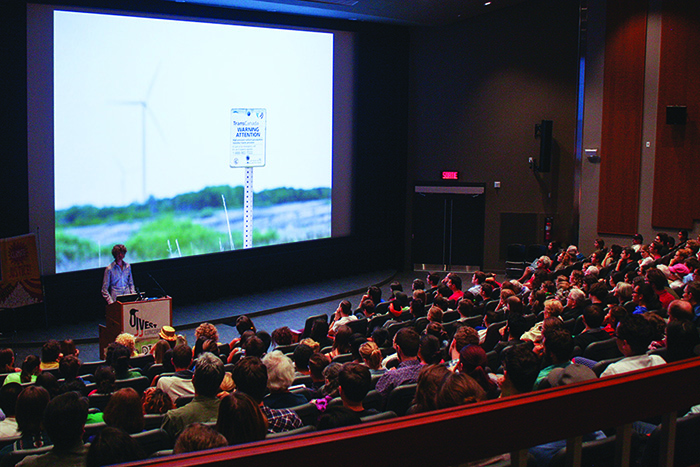Organizers of the People’s Climate March (PCM), a demonstration aiming to create momentum within the climate change awareness movement, held a speaker event at McGill last Wednesday.
Montreal was the PCM’s sole Canadian stop of their North American tour, which was created to spread awareness throughout the continent. The event was hosted by groups and organizations including Divest McGill, Divest Concordia, the Students’ Society of McGill University (SSMU), and the Concordia Student Union.
The speakers at the event included Bill McKibben, environmentalist, author, and founder of 350.org; Ellen Gabriel, a Mohawk activist fighting for indigenous rights; and Robert van Waarden, a climate environmental photographer.
McKibben stated that he understood the difficulty that those opposing climate change face when challenging large, multi-million dollar firms, who may prioritize profits over environmental issues. According to McKibben, the PCM is therefore crucial for standing up to large firms.
“We shouldn’t have to be here because reason should carry the day, but reason doesn’t carry [the] day always, not when there’s the type of money at stake that there is here,” McKibben said. “When you have that kind of money […] it buys you a lot more political influence then you deserve to have.”
Gabriel agreed, calling out the managing officers of large energy companies such as Trans Canada and Enbridge, claiming that the companies’ use of fracking and tar sands harmed the environment and the people living in the surrounding areas.
“They know […] that if there is a pipe leak that the chemicals they use […] are toxic […] and that it’s going to contaminate the environment for a long, long time,” Gabriel said. “To me, that is a crime against humanity because they are threatening your very well being. They are threatening your very livelihood.”
Van Waarden spoke about his individual project, the Along the Pipeline Project, which features photographs of individuals who live along the route where the Energy East pipeline would be built in Canada. The pipeline would transport crude oil from western provinces to refineries in Eastern Canada.
Van Waarden’s project is a collection of portraits of members of the community, not all of whom are united in stance on the pipeline.
“Every person I spoke to, every person along the pipeline—whether they were for the pipeline, or whether they were against the pipeline—everybody wants to see Canada move towards renewable energy,” he said. “To change everything, we need everyone.”
When asked how students could encourage McGill to divest from fossil fuels, McKibben indicated that the current efforts, such as those by Divest McGill, were steps in the right dirrection.
“[The students] will just have to increase the pressure, doing more organizing and taking a firmer line,” McKibben said.
While the event rallied the audience against climate change, not everyone agreed with what the speakers had to say. Amanda Lickers, an audience member, interrupted McKibben’s speech to criticize his work with 350.org, as well as the organizational structure of the PCM.
“There’s no involvement of indigenous territories whatsoever,” she said. “[Furthermore], local community organizers who belong to racialized communities who are impacted by Hurricane Sandy are not being meaningfully included.”
According to Kristen Perry, the Environment Commisoner at SSMU, the goal of the organization is to persuade McGill administration to end McGill investments in fossil fuels, a cause which fell in line with the goals of the PCM.
“I encourage you to get engaged [and] stay engaged—take part in the PCM in NYC or here in Montreal, join a climate justice group, make alliances,” Perry said. “Use whatever skills and resources you have to contribute however you can.”
The People’s Climate March will take place on Sept. 21 worldwide.









